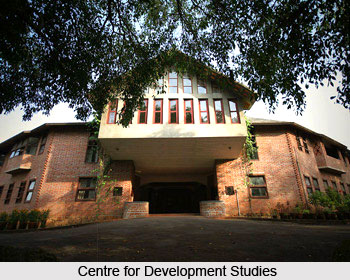 The Centre for Development Studies (CDS) is an autonomous research institute. Its main objective is to promote research, teaching and training in disciplines relevant to development. Established in 1971 by the noted economist Professor K.N. Raj, it is considered to be one of the foremost development economics research centres in the country. It has a faculty of about 26. The core activities of the CDS are research, teaching and training. Research at CDS is organized into six distinct themes: Agriculture and natural resources; gender, migration, population; health and education; poverty, vulnerability and social security; industry; trade and technology. There is a seventh cross cutting theme, analysing the impact of globalisation on each of the six themes. The CDS has two teaching programmes: a two year MPhil Programme in Applied Economics, and a four year PhD Programme in Economics. Both programmes are affiliated to Jawaharlal Nehru University, New Delhi. The University of Kerala also has recognized CDS as a centre for its doctoral studies. Further, it has a number of short duration training programmes.
The Centre for Development Studies (CDS) is an autonomous research institute. Its main objective is to promote research, teaching and training in disciplines relevant to development. Established in 1971 by the noted economist Professor K.N. Raj, it is considered to be one of the foremost development economics research centres in the country. It has a faculty of about 26. The core activities of the CDS are research, teaching and training. Research at CDS is organized into six distinct themes: Agriculture and natural resources; gender, migration, population; health and education; poverty, vulnerability and social security; industry; trade and technology. There is a seventh cross cutting theme, analysing the impact of globalisation on each of the six themes. The CDS has two teaching programmes: a two year MPhil Programme in Applied Economics, and a four year PhD Programme in Economics. Both programmes are affiliated to Jawaharlal Nehru University, New Delhi. The University of Kerala also has recognized CDS as a centre for its doctoral studies. Further, it has a number of short duration training programmes.
The Centre is an autonomous research and teaching institution. Decisions on all policy matters rest with its Governing Body, which has included among its members outstanding scholars in economics and other disciplines related to development, educationists, planners as well as administrators. The Governing Body has delegated several of its powers and duties to a sub-committee called the Committee of Direction. This Committee functions within the broad policy guidelines laid down by the Governing Body. The Governing Body has also constituted a Finance Committee responsible for monitoring the Centre`s budget. Another Committee is the Faculty Committee, comprising of the Fellows and two of the Honorary Fellows of the Centre, to function as an important advisory on academic and administrative matters. In fact the Faculty Committee assist the Director in carrying out the day-to-day management of the Centre. The Committee of Direction for M.Phil and PhD includes all Fellows of the Centre and two nominees of the Jawaharlal Nehru University to which the Centre is affiliated for its M.Phil and Ph.D Programmes: the Committee is concerned with curriculum and syllabi, award of grades to the candidates, and such other matters relating to the programmes. The Academic Committee of the Centre includes all academic staff, Registrar, Administrative Officer, Publication Officer, Librarian and representatives of the students.
The Financial resources for the Centre come from a number of sources. Core funding is provided by the Indian Council of Social Science Research, New Delhi and the Government of Kerala. In recent times, funding from these two sources together accounted for about two third of the expenditure of the Centre. The other sources of funding include annual yield from the Government of Kerala for research on Local Self Governments, Endowments instituted by the Indian Planning Commission, Reserve Bank of India, Dr. P.K. Gopalakrishnan Endowment, Dr. B.G. Kumar Endowment, annual contributions from Dr. Malcolm Adiseshiah Trust, The Ministry of Indian Overseas Affairs, Government of India and a few other smaller endowments. In addition, the Centre generates funds through sponsored research projects as well as occasional short-term training programmes. The Centre started building up a Corpus Fund to meet contingencies as well as to take care of, even if partially, any future funding uncertainties.






